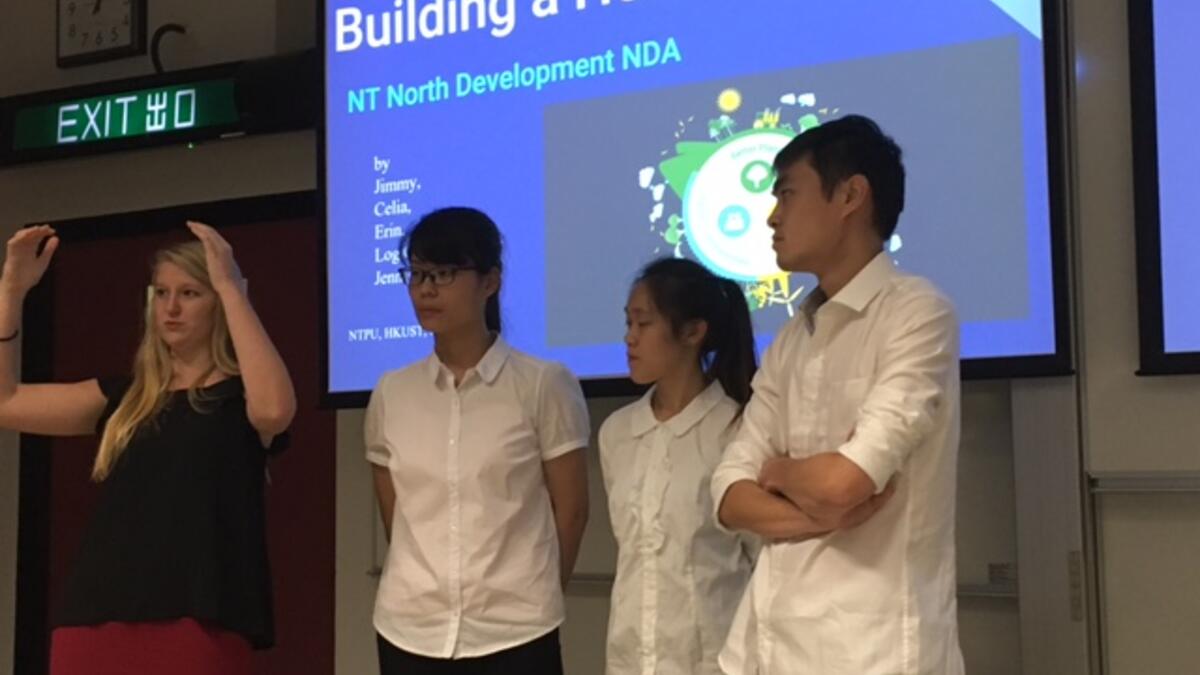3 countries, 3 universities, 1 unforgettable experience

ASU sustainability senior Hailey Baker and her student team present their work to the class.
For ASU sustainability senior Hailey Baker, three countries plus three universities plus three weeks adds up to one unforgettable experience.
Baker and 31 other students – representing Arizona State University, Hong Kong University of Science and Technology, and National Taipei University – traveled to three cities in Southern China for their summer studies, part of a program supported by the Rob and Melani Walton Sustainability Solutions Initiatives, the Julie Ann Wrigley Global Institute of Sustainability and the ASU Study Abroad Office.
During the three-week course on sustainable urban development, students experienced field trips and lectures in three cities: Guangzhou, China; Taipei, Taiwan; and Hong Kong. Then, working in teams with peers from each participating university, each group of students completed a final solutions-focused project, including development of sustainability plans for a new district in Hong Kong.
Living a comparative analysis
“The students lived a comparative analysis,” said Rob Melnick, presidential professor of practice in ASU’s School of Sustainability. Melnick, along with instructor and sustainability doctoral candidate Joe Knott, co-taught the course with faculty from the two partner universities.
“I thought Hong Kong and Taipei were more western — Hong Kong had more of a British influence, while Taipei was more U.S.-influenced,” Baker noted. “Guangzhou definitely felt more like what I expected from an Asian city.”
Guangzhou was less developed than Hong Kong or Taipei, Baker said, and she found it interesting to see first-hand how the city is developing.
Fellow ASU participant Eric Trinh, a sophomore chemical engineering major, was surprised by the transportation systems in the different cities. “Such an amazing and effective strategy for mass transit exists,” Trinh said. “I know it’s difficult to incorporate this into America because of urban sprawl, but I think we can make an effort to make a denser and more efficient city.”
We’re all in this together
This course, which builds upon a course that Melnick previously developed and taught at City University of Hong Kong, is listed at HKUST as a course on Global Citizenship — the idea that “we’re all in this together” as residents of the same planet. Students learn to think globally and act locally — while working together across cultural and disciplinary divides.
“During this unique, multi-cultural, educational experience, it was personally rewarding for me to see our ASU students grasp the significance of sustainability concepts and stakeholder engagement as well as a growing understanding among all of the students regarding their shared future and responsibility as global citizens to ensure that it is sustainable,” Knott said.
“I had one economics major, one finance major and one architecture major on my team; none of them had ever dealt with sustainability before,” Baker said. “Once they began to understand the sustainability aspects, they were able to ask questions to poke holes in my ideas. They brought local background knowledge to improve our plan for their local cities.”
Baker said needing a translator to get everyone on the same page was stressful, especially under deadline. But her group had a lot of passion, everyone contributed ideas, and people got really excited.
Trinh agreed. “I think the best part of the program was the students from other cultures. The lectures and field trips were amazing, but the classmates are the ones that breathe life into the course,” he said. “Studying abroad really opens up your perspective so much and gives you meaningful connections and networks around the world.”
“Learning what it means to be a global citizen – to work with people from other cultures to find solutions to shared social, economic and environmental problems — should be central to an education in sustainability,” Melnick said. “This course enabled our students to do just that.”
This program is one of more than 250 in more than 65 countries organized by the ASU Study Abroad Office. Students can participate in programs as short as a week, as long as a year and everything in between for academic credit.
More Environment and sustainability

Mapping DNA of over 1 million species could lead to new medicines, other solutions to human problems
Valuable secrets await discovery in the DNA of Earth’s millions of species, most of them only sketchily understood. Waiting to be…

From road coatings to a sweating manikin, these ASU research projects are helping Arizonans keep their cool
The heat isn’t going away. And neither are sprawling desert cities like the metro Phoenix area.With new summer records being set…

New study on Arctic’s ‘Last Ice Area’ highlights the urgency for reducing warming
The Arctic’s “Last Ice Area” — a vital habitat for ice-dependent species — might disappear within a decade after the central…